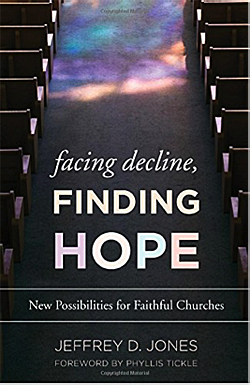
DARREN CRONSHAW finds Jeffrey D Jones’ Facing Decline, Finding Hope: New Possibilities for Faithful Churches a refreshing take on what a ‘successful’ church looks like…
Facing Decline, Finding Hope: New Possibilities for Faithful Churches,
Jeffrey D Jones
Rowman & Littlefield, US, 2015,
ISBN-13: 978-1566997324

“We need priestly functions, and congregational revitalisation, but we also need prophetic leadership to stand in contrast and urge us to move beyond maintenance and survival-seeking and to pursue God’s mission in the world.”
Over the last six or seven years (since early 2010) the church I have pastored has grown, plateaued and declined, if the one important metric is Sunday attendance. Missional literature helpfully urges us to adopt more of an incarnational posture. Community development literature urges us to serve our neighborhood. Congregational transformation literature shows us how lighthouse churches have reversed their decline. We have learned from all these, have trained and sent out leaders and started a community ministry, but overall Sunday attendance has declined. Our church situation of decline is not unusual in the Western world. It is why I immediately ordered this book when I saw it published.
Jeffrey Jones is associate professor of ministerial leadership at Andover Newton Theological School. He has served as a Baptist pastor and denominational staff member and written on congregational leadership. He does not avoid questions of growth and sustainability. But refreshingly and practically, Jones seeks to change the score card for how we measure “success”, or what he better terms “faithfulness”, and counsels how to find hope in tough times.
Firstly, Jones identifies churches tend to avoid bad news. Well-resourced churches are less likely to want to adapt for post-Christendom, postmodernity, new technologies and the rise of secularism that mean churches operate in a whole new world. At least churches in decline may be more ready to rely on God and radically rethink their approach to church.
The most interesting chapter for me was “Why Ezra and Nehemiah were wrong and what that means for us”, offering Biblical insights on the distinctions and tensions between priestly and prophetic leadership. In similarly tumultuous times, churches today are often like Nehemiah and Ezra, intent on rebuilding new walls and re-establishing old institutions as if that is what we need! Isaiah in exile more appropriately called God’s people to follow God’s new thing. We need priestly functions, and congregational revitalisation, but we also need prophetic leadership to stand in contrast and urge us to move beyond maintenance and survival-seeking and to pursue God’s mission in the world.
Moreover, Jones explores the leadership literature that urges institutions to choose deep change over otherwise slow death, and letting existing structures die for new life to appear: “This is a time in which we need to face the difficult, often painful reality that new life comes only when we die to the old life. Too many renewal efforts seek to avoid this practical and theological reality, and because they do so, they are unable to address the true nature of our situation and offer a solid hope for the future. We need to be more concerned about resurrection than renewal.”
Part two of the book subverts old assumptions with five new questions:
1. Rather than “How do we bring them in?”, ask “How do we send them out?”
2. Rather than “What should the pastor do?”, ask “What is our congregation’s shared ministry?”
3. Rather than “What’s our vision and how do we implement it?”, ask “What’s God up to and how do we get on board?”
4. Rather than “How do we survive?” (or “How do we structure?”), ask “How do we serve?”
5. Rather than “What are we doing to save people?”, ask “What are we doing to make the reign of God more present in this time and place?”
This is not rocket science, but recalls the essential function of churches as mission stations and disciple-making communities. Such questions remind churches to slow down to dream and listen, to face tough questions about identity and mission, to get in sync with the Kingdom of God and be prepared for fresh directions as crucibles of hope.
This will likely challenge values of existing church members and create conflict, but in part three Jones dangerously urges letting go of organisational efficiency and pithy mission statements, preoccupation with attendance and budgets. Instead he challenges leaders to courageously pursue the new things God wants to do in mission, and to foster the personal spirituality, patience and fortitude to embody this adventure with their churches.
Facing Decline, Finding Hope does not cause me to give up on hoping and working for our church to grow in numbers. Rather it reminds me to primarily persevere in reshaping a new kind of church that sends people to use their gifts to foster the reign of God in the midst of dislocation and confusion – not to rebuild the walls but to refind our prophetic voice and subversive calling. In this sense it is a gracious and hope-filled book that is a gift of wisdom to church leaders and an asset for our churches. I will be encouraging my colleagues and leadership teams to read and discuss it, and to plan for a future those new questions suggest.
This review was originally published in Journal of Religious Leadership (Spring 2016).
Follow this link to buy this book – Facing Decline, Finding Hope: New Possibilities for Faithful Churches.





